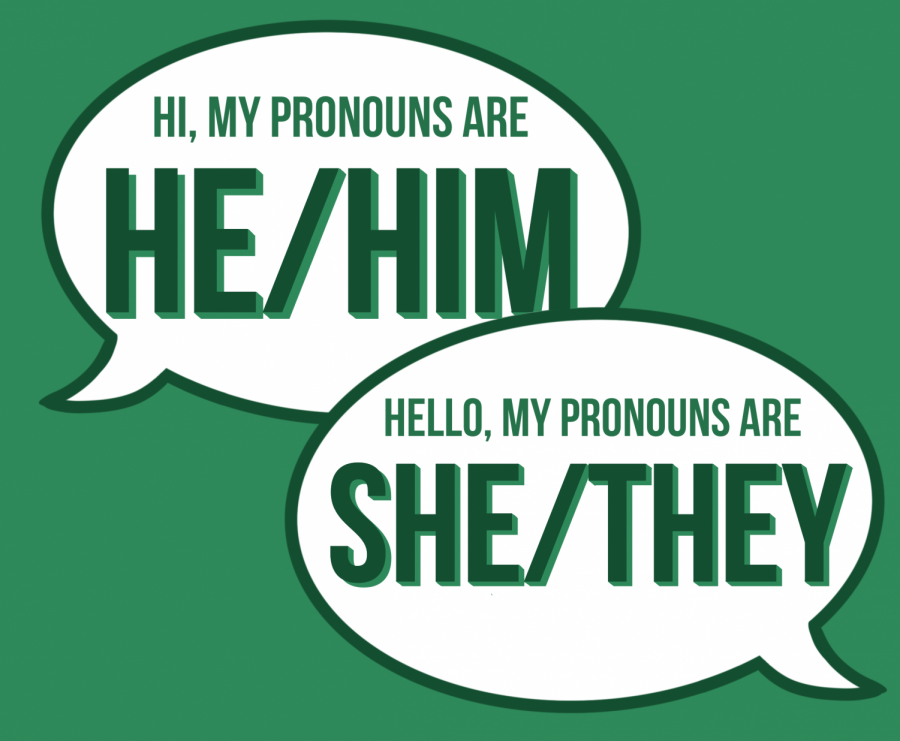CAMPUS: ‘It is aboout equity, equality and compassion’: Teachers work towards inclusive classroom environments
Through sending forms and asking directly, teachers are making efforts to include all students by addressing them with the correct name and pronouns.
On the first day of school, a teacher stands at the front of the classroom, addressing their class. After introducing themselves, each student stands up and introduces themselves along with their pronouns and a fun fact about them.
Starting the year with a supportive intent, many SCHS teachers and students have brought awareness to the importance of pronouns. With the advantage of a fresh start and new school year, many teachers have incorporated the use of pronouns through a system of both virtual and in-person resources.
Science teacher Lizzy Ho introduced pronouns in the form of a survey on the first day of school.
“I ask students at the start of the year using a ‘Get to know you’ Google form,” Ho said. “From there, I read student responses and made note of student’s pronouns on my seating chart to ensure when I call on students or reference them, I am using their preferred pronouns.”
Along with Ho, social studies teacher Chima Ikeme encouraged his students to share their pronouns on the first day of school to prevent any confusion later in the school year.
“We might give someone the wrong pronoun or misuse their pronoun, so asking reinforces using the correct pronoun,” Ikeme said.
Similarly, English teacher Arantxa Figueroa has been including her own pronoun system in her classes for multiple years and acknowledged the challenges with student responses in the past.
“When I first started (asking for pronouns), kids would laugh, and they would go, ‘Obviously I’m a he, look at me,’” Figueroa said. “So it’s been really interesting to have to detangle physiognomy – physical appearance to gender.”
With efforts to create a safe environment in his own classroom, Ikeme recognized the struggles of transgender students on campus.
“The more of those students that don’t have their preferred pronouns aligned with the gender that was assigned to them at birth tend to be marginalized,” Ikeme said. “Normalizing it and acknowledging it will hopefully lessen their marginalization and be more inclusive to the classroom for them.”
Along with teachers, students also felt the normalization of pronoun use in classrooms is beneficial. Freshman Garret Davis Barnes explained the significance and how it has had an impact on the LGBTQIA+ community.
“Teachers definitely make it a small deal, but it’s a big deal,” Barnes said. “We’re moving in a modern day and age. We’re no longer in a time where it’s as shameful to be queer.”
Along with Barnes, junior Mars Caldwell expressed his opinion of the use of pronouns in classrooms.
“I think they (teachers checking in with pronouns) are a hugely important step in the right direction,” Caldwell said. “They make the classroom feel a lot more comfortable for trans students, at least in my experience, and I’ve always felt safer in classrooms with these check-ins.”
Caldwell also described their experience with the reaction from students around them.
“I think the students at Santa Clara are very accepting of trans students and extremely understanding,” Caldwell said. “While I have had experiences with students being not as understanding and (being) disrespectful, the majority of students have been and continue to be very helpful.”
With a concern for privacy and respect, many teachers also use a system to refer to students in front of parents and guardians.
Science teacher Sara Carvalho acknowledged the importance of confidentiality and her role as a teacher supporting her students.
“The last thing I want to do is put that student in a position where, maybe, they’re not out to their parents, or they use a different name with their parents,” Carvalho said. “It’s not my place to bring that up to their parents, so I have a conversation with the students first and I’ll use whatever the student prefers.”
As the school year progresses, many teachers hope to continue to spread positivity and support on campus and in their classrooms.
“I just think we preach our mission statement. It is about equity, equality and compassion, and I think if we’re going to show those attributes, we need to start with each other in the classroom,” Figueroa said.


